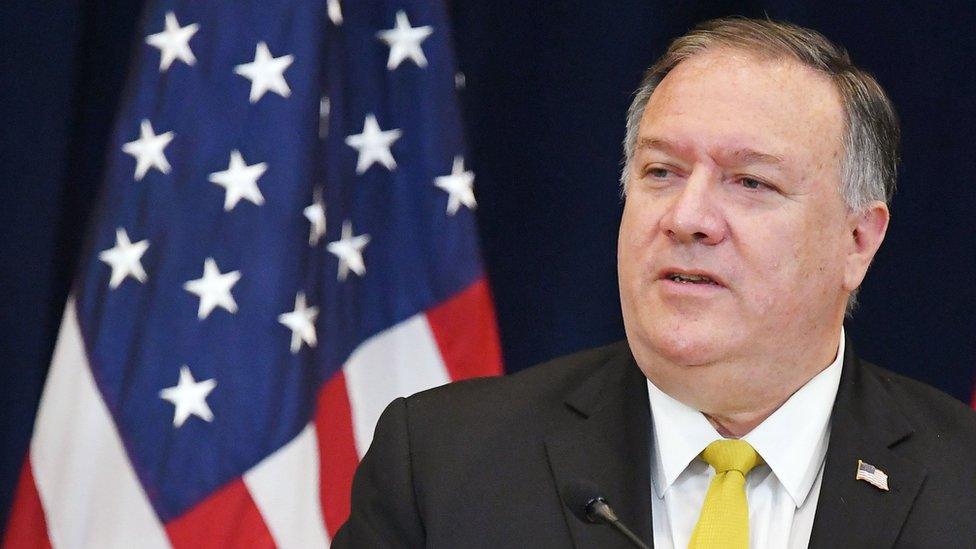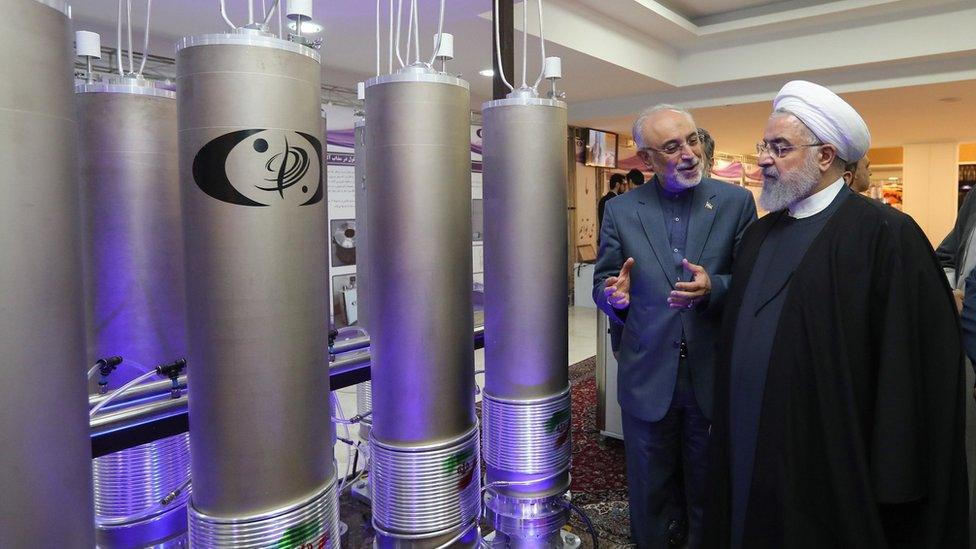Iran nuclear deal: European nations 'siding with ayatollahs' - Pompeo
- Published

US Secretary of State Mike Pompeo will submit a complaint to the UN Security Council
US Secretary of State Mike Pompeo has accused European allies of "siding with the ayatollahs" after they said the US could not reimpose sanctions on Iran.
The UK, France and Germany said the US did not have the legal right to trigger "snapback" sanctions because it pulled out of the Iran nuclear deal in 2018.
The US has controversially initiated a process at the UN Security Council to reinstate the UN sanctions.
They were lifted under the landmark 2015 nuclear agreement.
"No country but the United States has had the courage and conviction to put forward a resolution. Instead, they chose to side with the ayatollahs," Mr Pompeo said after formally submitting a complaint accusing Iran of non-compliance with the deal.
Other countries on the Security Council will have 30 days to adopt a resolution to avert the snapback. But, as a permanent member, the US will be able to exercise its veto power.
The US would do everything it could to enforce the sanctions on Iran if they were violated, Mr Pompeo added.
The Trump administration's move comes a week after the council rejected its bid to extend indefinitely an arms embargo on Iran that is due to expire in October.
Mr Pompeo said it would be an "enormous mistake" not to extend the arms embargo, adding that the US would never allow Iran to buy and sell conventional weapons such as tanks.
How did we get here?
Under the nuclear deal, the P5+1 group of powers - the US, China, France, Russia, the UK and Germany - gave Iran sanctions relief in return for limits on its sensitive activities and international inspections to show it was not developing nuclear weapons.
The accord has been close to collapse since the US withdrew and reinstated economic sanctions in 2018 in an attempt to force Iran to negotiate a replacement that would place indefinite curbs on its nuclear programme and also halt its development of ballistic missiles.

Iran's leaders insist that its nuclear programme is entirely peaceful
Iran has so far refused and has retaliated by rolling back key commitments, including those on the production of enriched uranium, which can be used to make reactor fuel but also nuclear warheads.
The five powers still party to the deal have tried to keep it alive, although the UK, France and Germany triggered a formal dispute mechanism over the Iranian breaches in January that could ultimately lead to the snapback of UN sanctions.

US isolated like never before

Mike Pompeo's assertion that Washington's key European allies are "siding with the ayatollahs" offers a test case of the failures of President Trump's approach towards Iran and of his foreign policy in general.
Foreign policy is about defining objectives; determining the means of getting there and, crucially, carrying other nations along with you. On Iran, the US has failed on every count.
The Trump administration's aim is to maintain the UN-backed arms embargo against Tehran. Most of its European allies agree with this goal.
China and Russia do not. But in seeking to use the mechanism of the Iran nuclear agreement to "snap back" sanctions, the Trump team is bizarrely seeking to employ the tools of a treaty that they themselves abandoned long ago. The result - the US is isolated on this issue like never before.

What does the US want?
After the US defeat at the Security Council last week, US permanent representative Kelly Craft declared that the Trump administration would "stop at nothing to extend the arms embargo" on Iran.
On Wednesday, the president announced that the US intended to "restore virtually all of the previously suspended United Nations sanctions on Iran".
"It's a snapback. Not uncommon," he told reporters in Washington. "My administration will not allow this Iran nuclear situation to go on. They will never have a nuclear weapon."
Allow X content?
This article contains content provided by X. We ask for your permission before anything is loaded, as they may be using cookies and other technologies. You may want to read X’s cookie policy, external and privacy policy, external before accepting. To view this content choose ‘accept and continue’.

Mr Pompeo stressed that under Security Council resolution 2231, which endorsed the nuclear deal, the US had a legal right to trigger the snapback.
"It has a set of provisions, it has a set of rights and obligations, and we will be in full compliance with that, and we have every expectation that every country in the world will live up to its obligations, including every member of the P5," he said.
In addition to maintaining the arms embargo, the snapped-back sanctions would force Iran to suspend all nuclear enrichment-related and reprocessing activities, and ban imports of anything that could contribute to those activities or the development of nuclear weapon delivery systems.
Sanctions on dozens of individuals and entities would also be reinstated.
How have other countries reacted?
Iranian Foreign Minister Mohammad Javad Zarif tweeted on Sunday, external: "US recourse to Dispute Resolution Mechanism in 2231 has NO LEG TO STAND ON."
Allow X content?
This article contains content provided by X. We ask for your permission before anything is loaded, as they may be using cookies and other technologies. You may want to read X’s cookie policy, external and privacy policy, external before accepting. To view this content choose ‘accept and continue’.

The five other remaining parties to the nuclear deal, all of which currently sit on the Security Council, are also opposed to the US plan.
Russian Deputy Foreign Minister Sergei Ryabkov said on Thursday that it was "absurd", adding that the administration had no legal grounds to do so.
European countries have said that President Trump made it clear in 2018 that the US had ended its participation in the nuclear deal and given up any rights.
It is not clear how the other countries might try to stop the US.
All UN member states would be obligated to enforce the snapped-back sanctions, although diplomats told Reuters news agency that some might refuse to do so.